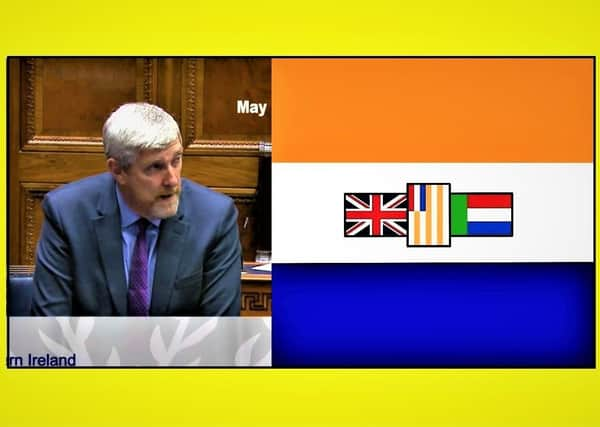Sinn Fein man: NI state’s law was the envy of racist apartheid regime


John O’Dowd made the remarks during a discussion on the floor of the Stormont Assembly about the centenary of Northern Ireland.
It came after the 100th anniversary of the state’s existence, which fell on Monday of this week.
Advertisement
Hide AdAdvertisement
Hide AdOpening the debate, TUV leader Jim Allister said: “Northern Ireland came into existence and continues to exist because of the will of its people.
“That is despite external and internal aggression. Externally, of course, for decades, our nearest southern neighbour overtly claimed our territory and allowed its territory to be used to facilitate the launch of terrorist attacks, and, internally, of course, we have had the besetting of vicious terrorism.
“Northern Ireland is, indeed, a triumph of democracy over terrorism.”
The DUP’s Johnny Buckley also paid tribute to “the many families of those who donned the uniform to defend this nation” - including “my great-uncle Bobby Crozier, who was killed by a terrorist act at Glenanne army camp as he donned the uniform to protect its citizens”.
Advertisement
Hide AdAdvertisement
Hide AdAnd UUP leader Steve Aiken said that “today marks the first day of our next century - and it should be a century of pride”.
When it came his turn to speak, Mr O’Dowd said: “It’d be quite easy to rise to the bait of Mr Allister’s usual angry performance.”
He said that partition led to “a state which systematically discriminated against a large proportion of its citizens” and that it “created laws such as the Special Powers Act which were the envy of the Apartheid South African Regime – that is not democracy”.
The Special Powers Act came into force in 1922, amid ongoing violence on the island linked to partition.
Advertisement
Hide AdAdvertisement
Hide AdIt gave police and the government wide-ranging powers to combat people and groups seen as destabilising the state.
Under its provisions, five different republican organisations (including Sinn Fein) were banned.
The act said: “If any person does any act of such a nature as to be calculated to be prejudicial to the preservation of the peace or maintenance of order in Northern Ireland and not specifically provided for in the regulations, he shall be deemed to be guilty of an offence.”
It gave the state the power to shut down pubs, ban assemblies of people, and enact curfews if it was believed that peace and order were under threat.
It was repealed in 1973.
Advertisement
Hide AdAdvertisement
Hide AdIn South Africa, until its collapse in the mid-1990s, the apartheid regime strictly enforced racial segregation, banning people from having inter-racial relationships.
Murder, disappearance and torture of dissidents (including rape and sexual torture) were frequently meted out by the white-minority regime.
In practice this meant light-skinned people effectively ran South Africa, with darker-skinned people reduced to second-class citizens.
The Truth and Reconciliation Commission reported in 2002 that it had taken statements from more than 19,050 people who could provably be regarded as “victims of a gross violation of human rights” (though it noted that the true unrecorded number would be much higher) – with “gross violations” defined as “killing, abduction, torture or severe ill-treatment” with a political motivation.
Advertisement
Hide AdAdvertisement
Hide AdMr O’Dowd also hailed the Good Friday Agreement as being the reason “why we all sit in here today, why we all share power together”.
“I believe democracy - that much used word - will create a new beginning on the island of Ireland,” he said.
“A young republican said to me a number of years ago - we will be the generation that live for Ireland. No more should any generation die for Ireland.”
According to Ulster University’s CAIN service, the IRA killed at least 1,705 people during the Troubles (though the genuine figure is likely significantly higher).
By contrast, 277 IRA members were killed.
More from this reporter:
Advertisement
Hide AdAdvertisement
Hide Ad——— ———
A message from the Editor:
Thank you for reading this story on our website. While I have your attention, I also have an important request to make of you.
With the coronavirus lockdown having a major impact on many of our advertisers — and consequently the revenue we receive — we are more reliant than ever on you taking out a digital subscription.
Advertisement
Hide AdAdvertisement
Hide AdSubscribe to newsletter.co.uk and enjoy unlimited access to the best Northern Ireland and UK news and information online and on our app. With a digital subscription, you can read more than 5 articles, see fewer ads, enjoy faster load times, and get access to exclusive newsletters and content. Visit https://www.newsletter.co.uk/subscriptions now to sign up.
Our journalism costs money and we rely on advertising, print and digital revenues to help to support them. By supporting us, we are able to support you in providing trusted, fact-checked content for this website.
Alistair Bushe
Editor